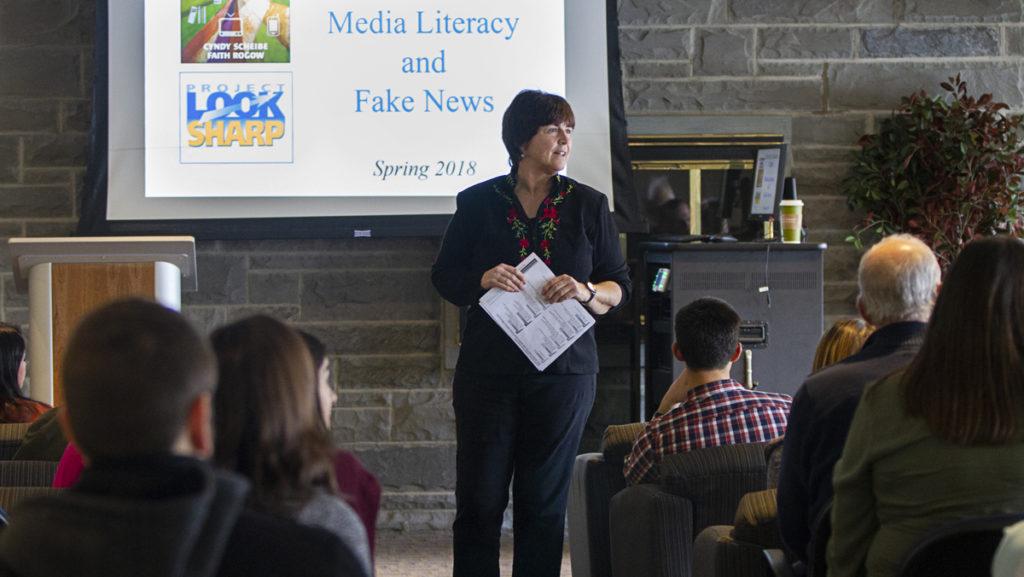The School of Humanities and Sciences at Ithaca College has approved a new interdisciplinary minor in media literacy. Students can begin to declare the minor in Fall 2019.
Cyndy Scheibe, professor in the Department of Psychology and coordinator of the media literacy minor, said media literacy allows media consumers to better understand the types of messages that are being displayed in the media and learn how to create those messages themselves.
“By media literacy, we also mean critically thinking about media messages that we see and read and hear, including judgments about what’s credible on websites, social media and in the news,” Scheibe said. “But, it also includes making media messages, which we support kids doing as soon as possible. It’s sort of reading and writing in today’s world.”
Scheibe has been advocating for the minor to be implemented at the college for the past 10 years and feels that the minor is one of importance and interest to students. She said media literacy has been taught around the globe for approximately 30 years but is coming late to the United States.
She said the main reason that media literacy has garnered much attention recently is because of President Donald Trump and his use of Twitter as well as the public’s increased awareness of fake news. She also credits the rise of media literacy to the growth of social media and the quick rate at which lies and radical content spread across the internet.
“All of that has made media literacy more important than ever, and it’s a good time to have it as a minor,” Scheibe said.
Scheibe said that based on reactions to presentations she has given to students focusing on fake news and from conversations she has had with students enrolled in her media literacy courses, she believes that there is student interest in the minor.
“There is strong interest from students in many different majors and also from faculty in many different majors, so that’s one of the reasons why I think the minor has been approved,” Scheibe said.
James Rada, associate professor and chair of the Department of Journalism, teaches a course on media literacy in the Roy H. Park School of Communications. Though his course is not offered within the minor, he said he still feels that the minor adds immense value to the college.
“I think it’s of incredible value to the college,” Rada said. “I think it’s of incredible value to society because anytime you have an educational curriculum with the word literacy — whether it’s media literacy, a course in financial literacy, whether it’s a course in medical literacy — what you’re doing is providing people with tools and resources that allow them to be more analytical and critical consumers of whatever the topic is.”
Freshman Emma Waite is currently enrolled in Media Literacy and the Psychology of Inquiry with Scheibe. She said that the class is helpful in her understanding of media literacy and it is a beneficial skill for students to have.
“It is beneficial to students who want to be more aware of media in our environment,” Waite said. “Especially because a lot of people don’t know what media literacy is, and it would be good for more students to learn and become aware of it.”
She said the minor will require students to complete 18 credits as well as an e-portfolio. The only specific course requirement for students to take is either Media Literacy and the Psychology of Inquiry or Media Literacy and Popular Culture. Both of those courses existed prior to the creation of the minor.
Scheibe said the remaining 15 credits can be taken from approximately 25 different designations of courses intersecting the various schools. The minor will require students to choose a core theory course, two courses related to interdisciplinary media analysis perspectives, one course that deals with media creation and one course in media literacy application.
Scheibe said the only course limitations are some of the courses offered in the Roy H. Park School of Communications that may be restricted by major or require a prerequisite. These courses may apply to the minor for students who are in the Park School but will not be listed as attribute courses.
Scheibe said the minor challenges students to take various courses across the different schools. Only six credits can be taken with the same subject code prefix, and students must take courses with four different subject code prefixes. This limits students to the types of courses they are able to take and allows variation of learning within the minor. Subject code prefixes are abbreviations for departments on campus. Examples of subject code prefixes include ART, POLT, CSCR and SOCI.
Scheibe said that because the courses offered come from various departments across campus, the minor is applicable to almost every student. She said media literacy is a vital skill for students to have when they leave college.
“Media literacy is learning to effectively communicate in many different realms, so it’s just really literacy in today’s world, which is why it’s so important,” Scheibe said. “The minor could apply to, I would argue, people in almost every field … because if all you can do is read and write on paper, then you’re not literate in today’s world.”








